
-
Trouvez l’alimentation idéale pour votre animalDécouvrez quelle alimentation correspond aux besoins spécifiques de votre animal.Trouvez l’alimentation idéale pour votre animalDécouvrez quelle alimentation correspond aux besoins spécifiques de votre animal.Produits recommandés
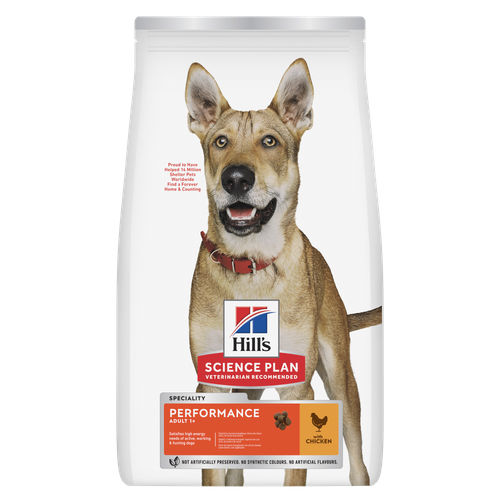 Performance - Croquettes pour Chien Adulte
Performance - Croquettes pour Chien AdulteHill’s Science Plan Performance - Croquettes pour Chien Adulte (1+) au Poulet est formulé pour répondre aux besoins énergétiques supplémentaires des chiens actifs, de travail et de chasse.
Découvrir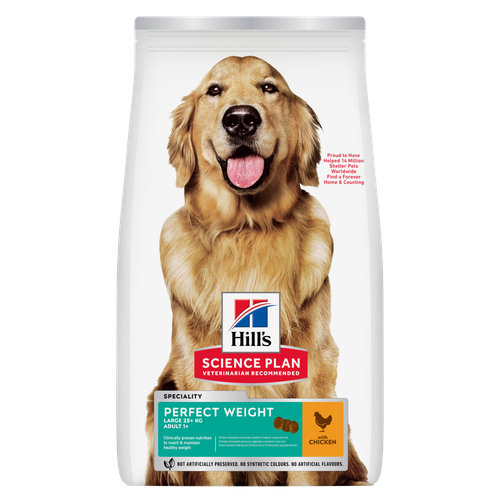 Perfect Weight - Croquettes pour Chien Adulte (1+) - Grande Race
Perfect Weight - Croquettes pour Chien Adulte (1+) - Grande RaceHill’s Science Plan - Perfect Weight - Croquettes pour Chien - Grande Race au Poulet est un délicieux aliment cliniquement prouvé pour aider le chien à atteindre et maintenir un poids sain.
Découvrir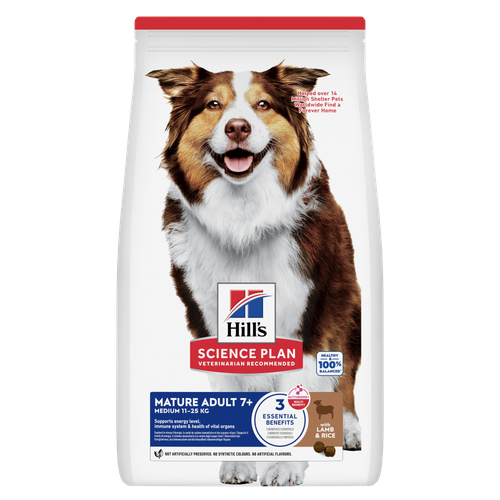 Mature - Croquettes pour Chien Mature - Moyenne Race
Mature - Croquettes pour Chien Mature - Moyenne RaceHill’s Science Plan Mature Adult - Croquettes pour Chien Mature à l’Agneau & Riz - Moyenne Race est un aliment complet spécialement formulé avec la technologie ActivBiome+ Multi-Benefit.
Cet aliment est spécialement formulé pour répondre aux besoins du chien vieillissant de moyenne race.DécouvrirProduits recommandés Adult - Croquettes pour Chat Adulte
Adult - Croquettes pour Chat AdulteHill’s Science Plan Adult - Croquettes pour Chat Adulte au Poulet est un aliment complet spécialement formulé avec la technologie ActivBiome+ Multi-Benefit.
Cet aliment est spécialement formulé pour répondre aux besoins énergétiques du chat pendant la période la plus active de sa vie.Découvrir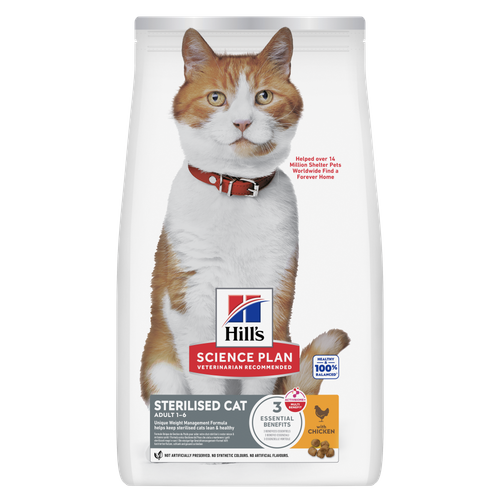 Sterilised Cat - Croquettes pour Chat Adulte Stérilisé
Sterilised Cat - Croquettes pour Chat Adulte StériliséHill’s Science Plan Adult Sterilised - Croquettes pour Chat Adulte au Poulet est un aliment spécialement formulé avec la technologie ActivBiome+ Multi-Benefit. Il s’agit d’un aliment équilibré, formulé pour répondre aux besoins du chat stérilisé, afin de l’aider à maintenir son poids de forme et à rester en bonne santé.
Découvrir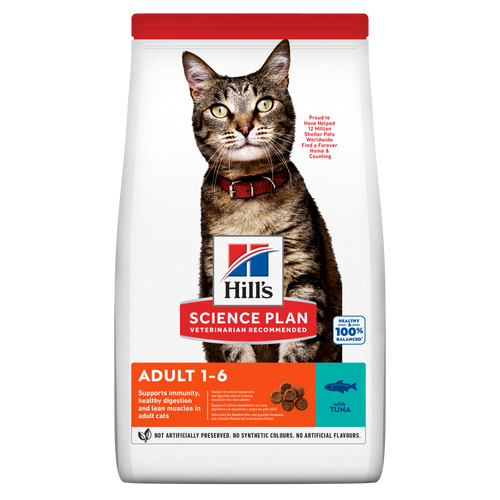 Croquettes pour Chat Adulte (1-6) - au Thon
Croquettes pour Chat Adulte (1-6) - au ThonHill’s Science Plan Adult - Croquettes pour Chat Adulte au Saumon est un aliment complet spécialement formulé avec la technologie ActivBiome+ Multi-Benefit.
Cet aliment est spécialement formulé pour répondre aux besoins énergétiques du chat pendant la période la plus active de sa vie.Découvrir -
Pour chienPour chatArticles à la une
 Variations de poids chez le chien et le chat : pourrait-il s’agir d’un trouble de la thyroïde ?
Variations de poids chez le chien et le chat : pourrait-il s’agir d’un trouble de la thyroïde ?Une variation de poids peut indiquer un problème de thyroïde. Découvrez les signes, les causes et ce que vous pouvez faire pour y remédier.
En savoir plus Prendre la température de votre chat ou de votre chien
Prendre la température de votre chat ou de votre chienLe fait de savoir prendre la température de votre chien (ou de votre chat) fait partie de votre engagement envers sa santé.
En savoir plus Comment savoir si mon animal est en surpoids et que faire ?
Comment savoir si mon animal est en surpoids et que faire ?Obésité et surpoids de l’animal : comment les prévenir, comment les repérer et comment agir si votre animal est en surpoids grâce à l’exercice physique, au contrôle des portions et au contrôle des calories.
En savoir plus -
Santé digestive du chat
Santé digestive du chat
Qu’est-ce qu’un trouble digestif chez le chat ?
Un trouble digestif (ou gastro-intestinal) est un état de santé qui empêche le chat de digérer correctement les aliments ou qui modifie la vitesse à laquelle les aliments passent dans le tube digestif. N’ignorez pas les signes ! Si votre chat présente des symptômes de troubles digestifs, demandez immédiatement conseil à votre vétérinaire.
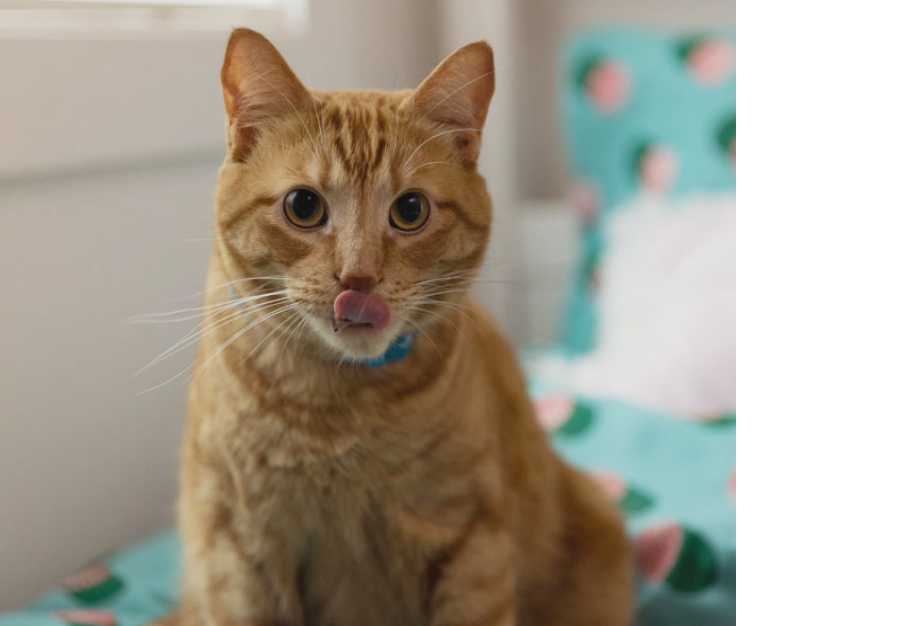
Signes qui peuvent indiquer un trouble digestif chez votre chat
Chez le chat, les troubles digestifs se manifestent le plus souvent par des selles molles ou de la diarrhée. Il est possible que votre chat présente un ou plusieurs symptômes digestifs, selon la nature et la gravité du trouble.




Signes qui peuvent indiquer un trouble digestif chez votre chat
Chez le chat, les troubles digestifs se manifestent le plus souvent par des selles molles ou de la diarrhée. Il est possible que votre chat présente un ou plusieurs symptômes digestifs, selon la nature et la gravité du trouble.




Exemples de troubles digestifs fréquents
Les troubles digestifs peuvent survenir pour diverses raisons, et tous peuvent faire que votre chat n’est pas en forme. N’oubliez pas que la diarrhée peut être difficile à détecter chez les chats qui font leurs besoins à l’extérieur. Si vous pensez que votre chat ne va pas bien, donnez lui un bac à litière afin de pouvoir voir ce qui se passe. Voici quelques-uns des troubles digestifs les plus courants chez le chat.
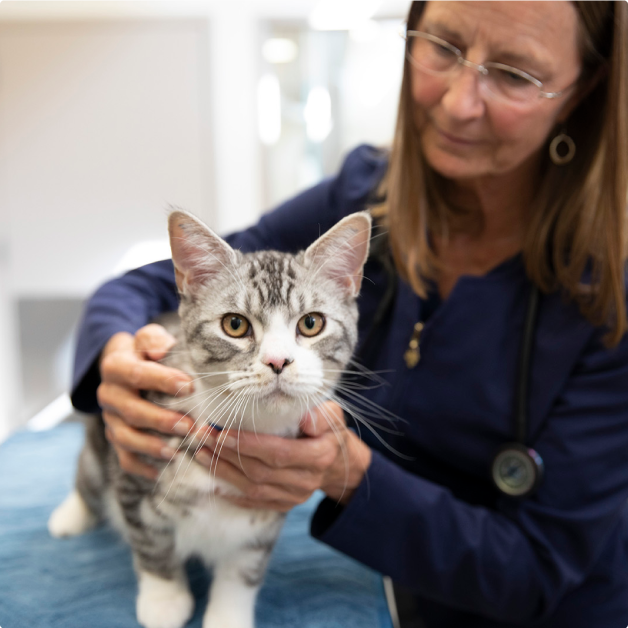

Il s’agit de la cause la plus fréquente des maux de ventre chez le chat. Elle consiste généralement en des vomissements et une diarrhée qui apparaissent soudainement. La gastro-entérite aiguë peut avoir de nombreuses causes, notamment l’ingestion d’un aliment peu ragoûtant (ou, comme beaucoup de chats aiment le faire, manger la moitié d’une souris et nous laisser le reste en cadeau), des parasites, des virus, des boules de poils, etc.
Contrairement aux troubles d’apparition soudaine que nous venons de mentionner, l’entéropathie chronique est plus lente à se manifester et a tendance à durer longtemps. La diarrhée et la perte de poids sont des signes courants. Là encore, les causes peuvent être multiples : réactions alimentaires indésirables, réactions immunitaires, génétique, etc.
Le côlon fait partie du gros intestin et son inflammation est appelée colite. Elle se manifeste de manière similaire chez la plupart des chats : ils ont l’air d’avoir besoin de déféquer de toute urgence, mais ils éprouvent des difficultés et ne font pas grand-chose. Par ailleurs, l’un des signes courants de la colite est la présence de sang frais et/ou de mucus visqueux dans les selles.
Comme pour l’homme, le chat constipé a du mal à faire ses besoins et va moins souvent se soulager. La constipation peut avoir de nombreuses causes. Le fait de manger des os, des plumes et des poils peut rendre les selles dures et difficiles à évacuer ; et si le chat ingère beaucoup de poils, en particulier chez les chats à poils longs, ou a un intestin paresseux, ses selles seront sèches et difficiles à évacuer. Certaines races, comme le siamois, sont plus sujettes à la paresse intestinale que d’autres. Il peut en résulter une affection appelée mégacôlon.
Chez le chat, il s’agit d’une affection complexe qui peut être difficile à diagnostiquer en raison de signes vagues. Ces signes comprennent les vomissements, la léthargie et le manque d’appétit. Chez le chat, cette affection peut apparaître de manière intermittente et va souvent de pair avec d’autres troubles tels que les réactions indésirables aux aliments et les maladies inflammatoires de l’intestin.
Le chat peut réagir négativement à certains aliments pour un certain nombre de raisons. Il s’agit de réactions alimentaires indésirables. Les véritables allergies alimentaires sont plus rares qu’on ne le pense et sont généralement causées par les protéines contenues dans les aliments tels que le poulet, le poisson et le lait. Les allergies alimentaires peuvent provoquer des vomissements et des diarrhées, ainsi que des troubles cutanés tels que démangeaisons et le toilettage excessif.
Comment aider votre chat ?
Tout d’abord, si vous pensez que votre chat présente un trouble digestif, n’hésitez pas à consulter votre vétérinaire. Il pourra vous conseiller sur les traitements les plus adaptés pour le soulager. Vous pouvez également soutenir votre chat en réduisant les sources de stress dans son environnement. Voici quelques suggestions pour limiter les déclencheurs pouvant aggraver ses troubles digestifs :
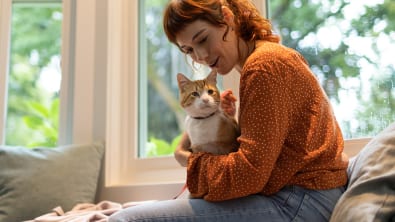

Respecter une routine
Les changements d’environnement ou de routine de votre chat peuvent entraîner des troubles gastro-intestinaux. Le fait d’offrir à votre chat un environnement calme et sûr, ainsi que des moments de jeu réguliers, peut soulager son anxiété.
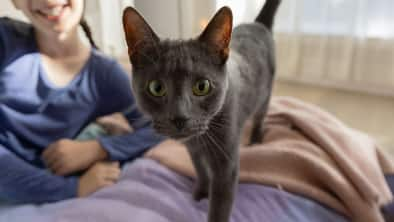

Protéger votre chat contre les puces et les vers
Les parasites comme les ascaris ou les ankylostomes peuvent provoquer des troubles digestifs chez le chat. Si votre chat aime explorer l’extérieur, veillez à ce qu’il bénéficie d’un traitement préventif adapté pour le protéger efficacement.


Adaptez son alimentation
Une alimentation adaptée peut aider à soulager un système digestif sensible. Demandez conseil à votre vétérinaire pour savoir s’il est nécessaire de changer l’aliment de votre chat, et comment effectuer cette transition en douceur, sans perturber davantage sa digestion.
Comment aider votre chat ?
Tout d’abord, si vous pensez que votre chat présente un trouble digestif, n’hésitez pas à consulter votre vétérinaire. Il pourra vous conseiller sur les traitements les plus adaptés pour le soulager. Vous pouvez également soutenir votre chat en réduisant les sources de stress dans son environnement. Voici quelques suggestions pour limiter les déclencheurs pouvant aggraver ses troubles digestifs :


Respecter une routine
Les changements d’environnement ou de routine de votre chat peuvent entraîner des troubles gastro-intestinaux. Le fait d’offrir à votre chat un environnement calme et sûr, ainsi que des moments de jeu réguliers, peut soulager son anxiété.


Protéger votre chat contre les puces et les vers
Les parasites comme les ascaris ou les ankylostomes peuvent provoquer des troubles digestifs chez le chat. Si votre chat aime explorer l’extérieur, veillez à ce qu’il bénéficie d’un traitement préventif adapté pour le protéger efficacement.


Adaptez son alimentation
Une alimentation adaptée peut aider à soulager un système digestif sensible. Demandez conseil à votre vétérinaire pour savoir s’il est nécessaire de changer l’aliment de votre chat, et comment effectuer cette transition en douceur, sans perturber davantage sa digestion.
Aliments recommandés pour les chats présentant des troubles digestifs
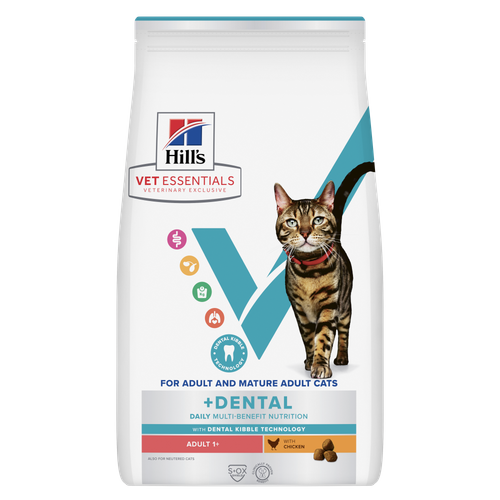
Hill's VET ESSENTIALS MULTI-BENEFIT + DENTAL Croquettes pour chat au Poulet (pour chats adultes et adultes matures âgés de 1 an et plus) est un aliment complet aux bénéfices multiples disponible exclusivement chez votre vétérinaire. Formulé avec une technologie de croquettes bucco-dentaires cliniquement prouvée pour réduire la formation de la plaque dentaire et du tartre lors de la mastication, pour des dents et gencives saines. Pour un meilleur quotidien, aujourd'hui et demain.
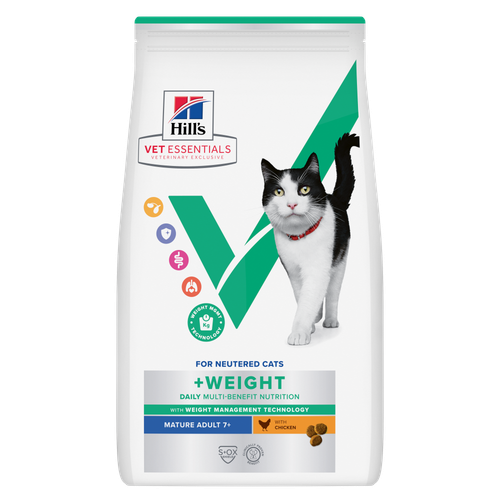
Hill's VET ESSENTIALS MULTI-BENEFIT + WEIGHT Croquettes pour Chat au Poulet (pour chats adultes matures âgés de 7 ans et plus, après la stérilisation ou pour les races prédisposées au surpoids) est une nutrition disponible exclusivement chez les vétérinaires, aux bénéfices multiples, formulée pour soutenir un poids optimal, la santé des organes vitaux et du système urinaire. Notre technologie unique de gestion de poids les aide à maintenir ou atteindre un poids optimal — pour un meilleur quotidien, aujourd'hui et demain.
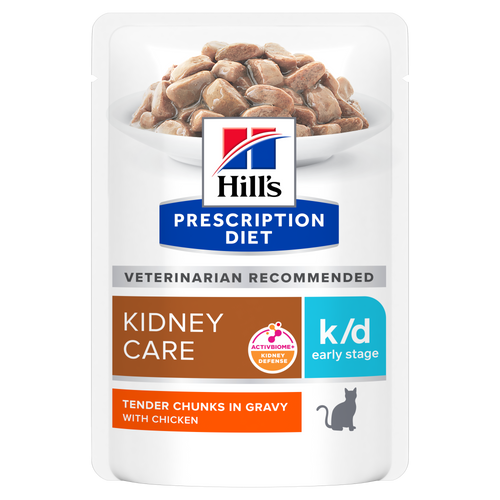
Délicieuse nutrition cliniquement prouvée pour améliorer la qualité de vie et prolonger la relation avec votre chat
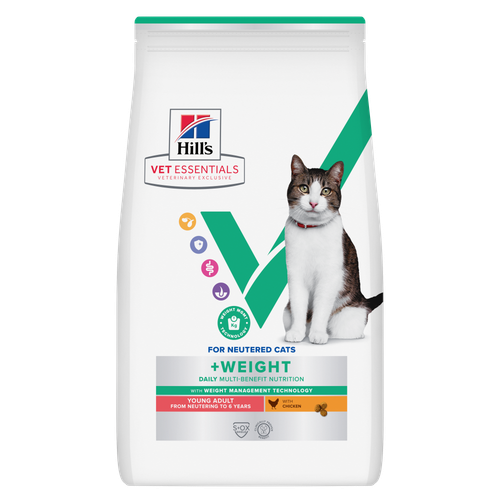
Hill's VET ESSENTIALS MULTI-BENEFIT + WEIGHT Croquettes pour Chat au Poulet (pour chats adultes stérilisés de 1 à 6 ans, après la stérilisation ou pour les races prédisposées au surpoids) est une nutrition disponible exclusivement chez les vétérinaires, aux bénéfices multiples, formulée pour soutenir un poids optimal, la santé des organes vitaux et du système urinaire. Notre technologie unique de gestion de poids les aide à maintenir ou atteindre un poids optimal — pour un meilleur quotidien, aujourd'hui et demain.
Ressources et conseils
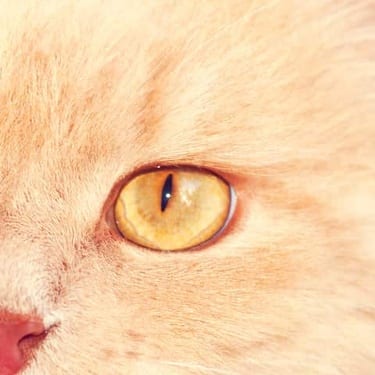
Le chocolat est connu pour être un poison pour le chien, mais il peut également être toxique pour le chat. Découvrez pourquoi le chocolat est mauvais pour le chat et ce qu’il faut faire si votre chat en a mangé.

Il est important de le nourrir en lui donnant une ration adaptée et à intervalles réguliers, mais cette tâche peut parfois s'avérer difficile.
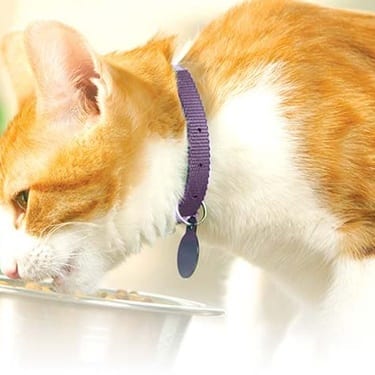
De nombreux aliments destinés à l’homme sont dangereux pour le chat. Découvrez les 5 aliments les plus toxiques pouvant être mortels pour le chat, ainsi que les quantités pouvant être nocives.
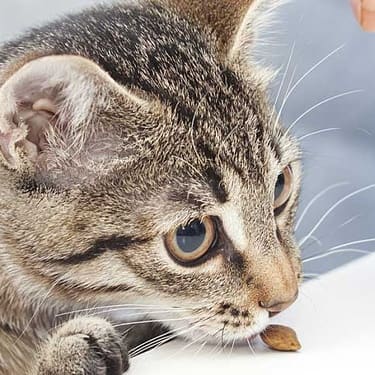
Le changement est un fait inévitable, même pour les chats. Prenez par exemple son premier anniversaire. C'est une étape importante car il s'agit d'une période de transition de chaton à chat adulte.

